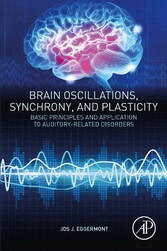Suchen und Finden
Service

Brain Oscillations, Synchrony and Plasticity - Basic Principles and Application to Auditory-Related Disorders
Jos J. Eggermont
Verlag Elsevier Reference Monographs, 2021
ISBN 9780128204085 , 266 Seiten
Format ePUB
Kopierschutz DRM
Geräte
Mehr zum Inhalt

Brain Oscillations, Synchrony and Plasticity - Basic Principles and Application to Auditory-Related Disorders
Brain Oscillations, Synchrony and Plasticity: Basic Principles and Application to Auditory-Related Disorders discusses the role of brain oscillations, especially with respect to the auditory system and how those oscillations are measured, change over the lifespan, and falter leading to a variety of psychiatric and neurological disorders. The book begins with a description of these cortical rhythm oscillations and how they function in both the normal and pathological brain. It explains how these oscillations are important to auditory, executive and attention brain networks and how they relate to the development, production and deterioration of speech and language.
In addition, treatment of malfunctioning cortical rhythms are reviewed using neuromodulation, such as transcranial magnetic, direct current, random noise, and alternating current stimulation, as well as focused ultrasound. The book concludes by describing the potential role of oscillations in dyslexia, autism, schizophrenia and Alzheimer's disease.
- Introduces readers to brain imaging methods such as structural and functional magnetic resonance imaging, EEG and magnetoencephalography, in the study of brain oscillations, synchrony and networks of the normal and pathological brain
- Highlights the role of brain oscillations in perception and cognition, in particular with respect to the auditory system, speech and language
- Describes lifespan changes, from preterm to senescence, of brain oscillations, brain networks and how they relate to the development and deterioration of speech and language
- Explains the effects of hearing loss on neural network change in the auditory and non-auditory networks such as the default mode-, the salience-, the executive- and attention networks
- Illustrates the breakdown of network connections in auditory-related disorders such as tinnitus and in psychiatric disorders with a strong auditory, speech and language component
Dr. Jos J. Eggermont is an Emeritus Professor in the Departments of Physiology and Pharmacology, and Psychology at the University of Calgary in Alberta, Canada. Dr. Eggermont is one of the most renowned scientists in the field of the auditory system and his work has contributed substantially to the current knowledge about hearing loss. His research comprises most aspects of audition with an emphasis on the electrophysiology of the auditory system in experimental animals. He has published over 200 scientific articles, authored/edited 8 books, and contributed to over 90 book chapters all focusing on the auditory system.
Shop

